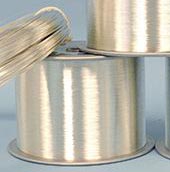Beryllium copper wire exceeds corrosion resistance when compared to most other specialty copper alloys. As a result of this durability, beryllium copper is frequently used in a wide array of different environments, such as marine, processing, and industrial environments.
Beryllium copper is suited for salt water and fresh water environments because it boasts a low corrosion rate with an innate resistance to biological fouling. When used at low velocities, corrosion rates in seawater are low—comparable to cupronickels. On the other hand, high velocity will accelerate corrosion for beryllium copper and many other copper alloys. It is possible for undersea cables to have a long life—exceeding thirty years of service—without any sign of harmful corrosion or fouling. Undersea communication cables are made from beryllium copper because of strong resistance to fouling and corrosion, but it is also used because it has excellent machinability and strength.
If you are dealing with esters, glycols, ketones, hydrocarbons, organic solvents, or alcohols, beryllium copper wire is the right choice for you. Plastics (acetal, polytetrafluoroethylene) can emit volatiles, but these fumes will not negatively affect copper alloys. Beryllium copper is compatible with aqueous solutions of alkali hydroxides in hot and cold environments. This alloy should only encounter ammonia if it is oxygen free and dry.
Other common service environments of beryllium copper include:
- Organics
- Urban
- Organic Fumes
- Mercury
- Hydrogen
Beryllium Copper
In each of the above environment, beryllium copper has stronger corrosion resistance than most other copper alloys. For more information on the strong resistance of beryllium copper wire, you should not hesitate to give our team a call.
Related Reading:

 Technical Data
Technical Data


